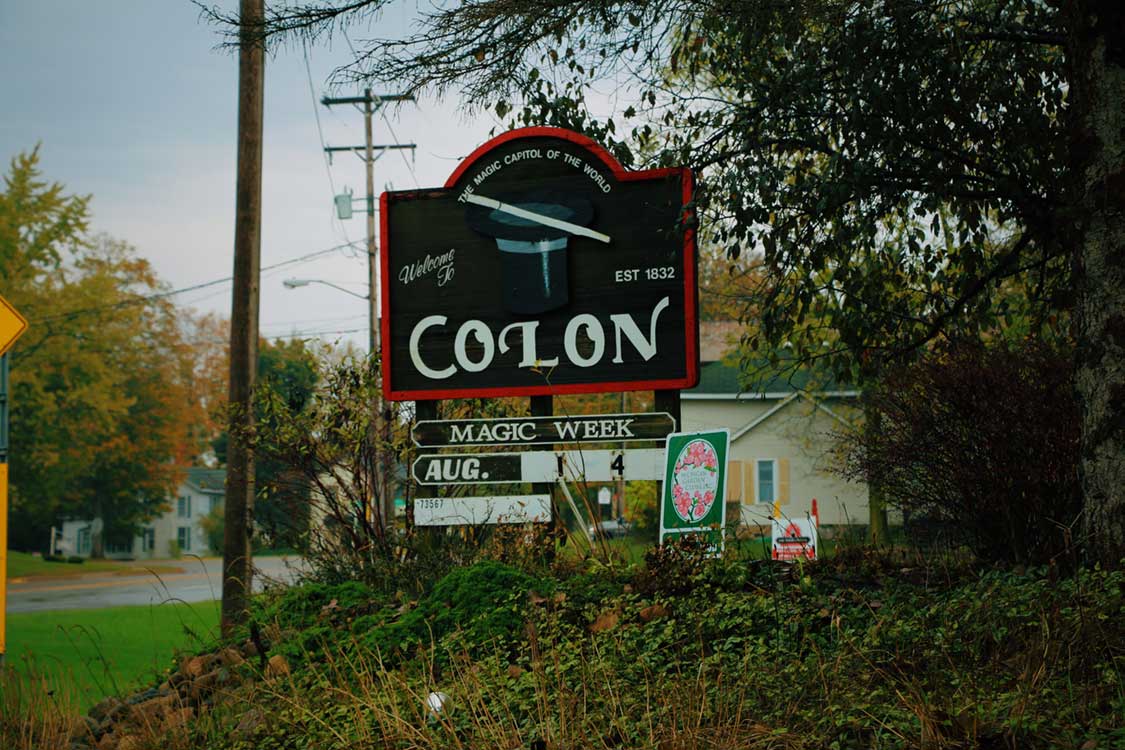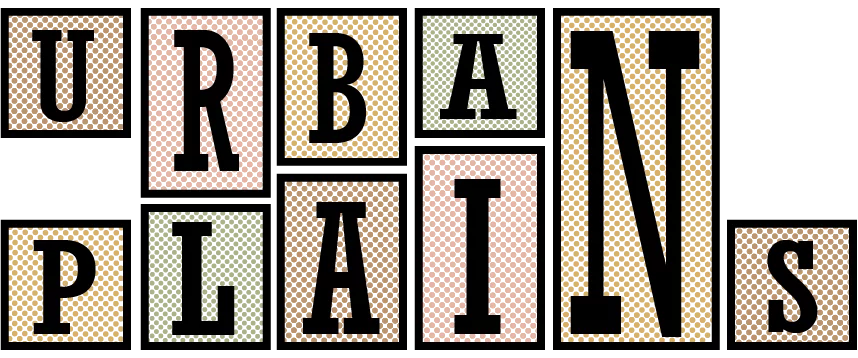photos by Matthew Gogerty
Colon, Michigan, a town with more dead magicians than stoplights.
If it wasn’t for the one stoplight in Colon, Michigan, you might miss the Magic Capital of the World. The forced stop on Highway 124 in Southern Michigan enables you, if only for a moment, to see a quaint little shop: The FAB Magic Company. Nestled between a self-proclaimed “world famous” sandwich shop and a costume maker is where the magic happens.
The scene inside the store resembles an I Spy book. Little knick-knacks and gadgets, old and obscure art, a semblance of Victorian overtones. The bookshelves are packed with texts that only magicians with a fine-tuned apprehension of the trade can understand. The oldest text dates back to 1926.
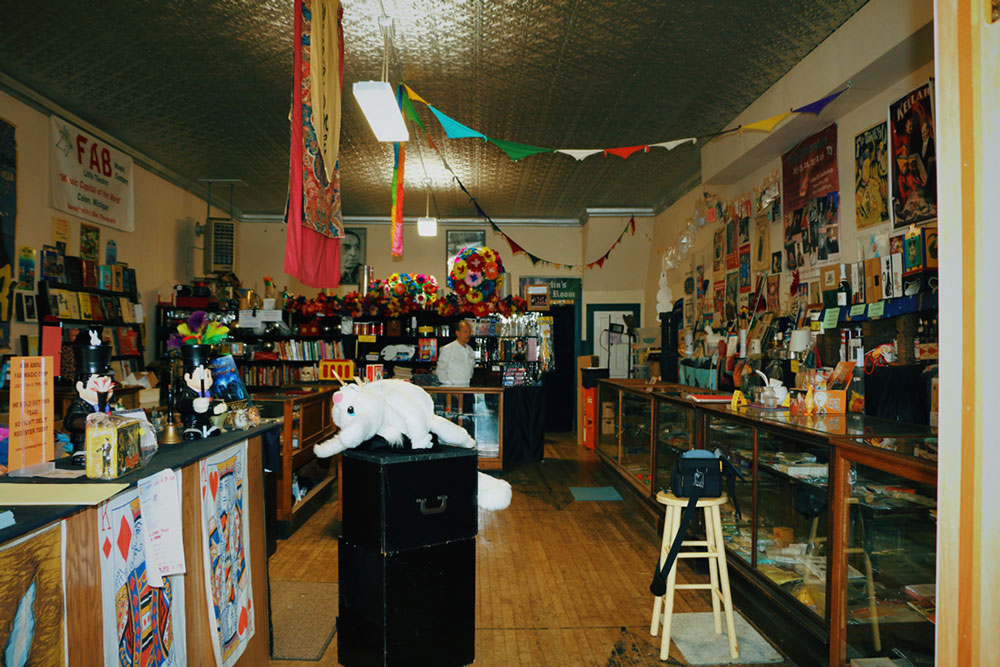
Rick Fisher owns FAB — short for The Fisher-Abbott Magic Company — along with the Abbott family, and has been in business since 2003. Initially, the group tried to buy back the other shop in town — the world-famous Abbott’s Magic — but were unsuccessful, for reasons Fisher claims, “I will never tell anyone.” This is fitting for magicians, that even their business dealings would be shrouded in mystery.
Fisher is used to mystery. It’s been a part of him for as long as he can remember. He learned to do magic when he was in fourth grade. His specialty is sleight-of-hand tricks, and he loves the way they act as an ice-breaker.
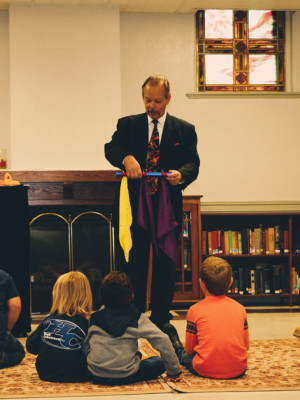 Fisher certainly looks like a magician, sporting a pronounced black suit tailored to ‘80s chic. His jacket screams “I have a million weird things in here, give me the chance to show you.” If given the opportunity, he will pull anyone into a ruse. At least, anyone who is willing to engage in the chicanery that makes him a magician.
Fisher certainly looks like a magician, sporting a pronounced black suit tailored to ‘80s chic. His jacket screams “I have a million weird things in here, give me the chance to show you.” If given the opportunity, he will pull anyone into a ruse. At least, anyone who is willing to engage in the chicanery that makes him a magician.
“The cardinal rule of a magician: You never perform the same trick twice in front of the same audience,” says Fisher.
He’s full of the nuances that make magic what it is: mysterious.
This mystery is why people visit Colon anymore. Most people just pass through, going to places like Detroit, or heading west for Chicago. There was a time though, when Colon had a following, mostly magicians, who would visit often. They would come to sharpen their skills or to learn new tricks.
Unknowing Assistants
Fisher is committed to his shop. He and his family take care of most duties, but he still employs three full-time staff and has a woodshop that employs another two.
“We make magic tricks here, pretty much anything you can dream up,” Fisher says. “Zombie balls are our specialty, they vary in size and shape. We use a hard plastic so they are a lot lighter and easier to use. Authentic floating balls are metal, so they are very heavy.”
The zombie balls – FAB’s name for the famous floating ball and curtain contraption – along with the other tricks FAB makes and sells, are a major part of their business.
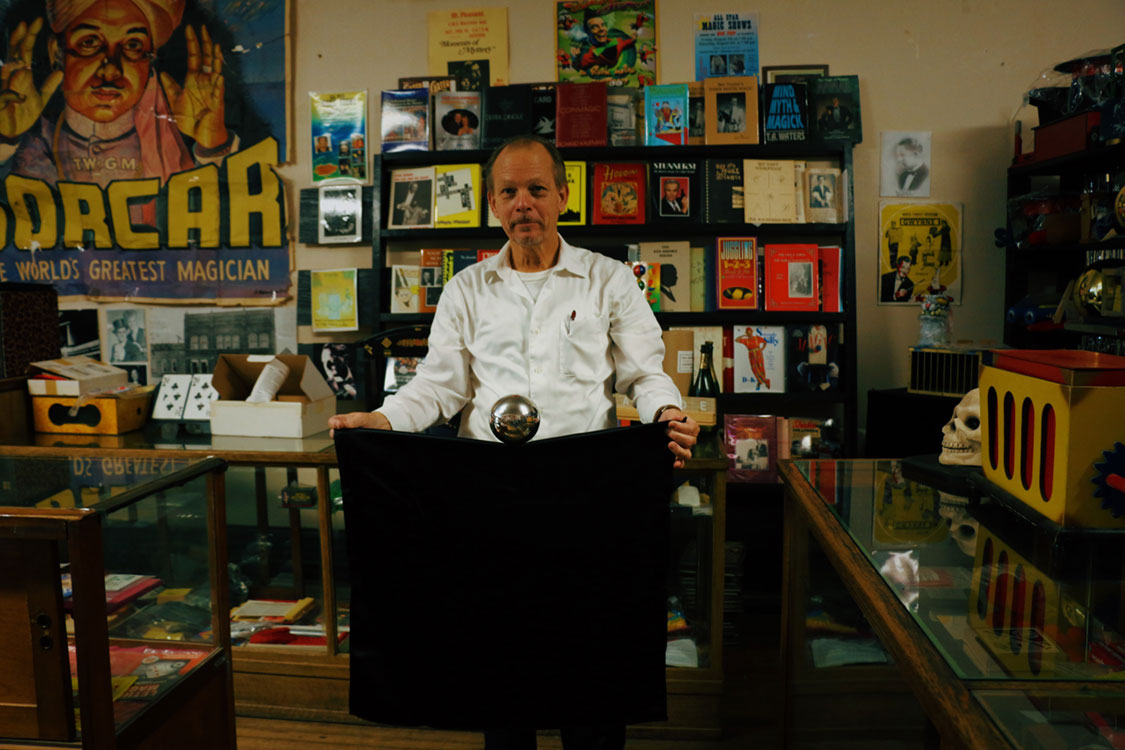
Four newcomers to Colon enter the store. They wanted to see what their new town had to offer so, obviously, they started with the magic. Fisher quickly moves in on them. Without a second to spare, Fisher tells them of Colon’s history, as if to sell them on the town they already live in. Then he shuffles them to the beginners section of the shop, where they gather to watch Fisher perform an assortment of sleight-of-hand tricks.
“People wonder how magicians make money,” says Fisher. “We make money a nickel and dime at a time. This trick turns one regular nickel into four dimes. See here you can touch it and feel that it is in fact just a nickel.”
“If you don’t buy it, you can’t have the secret — that’s most of what I’m selling.”
Then all of a sudden the nickel in his hand becomes four dimes, right in front of the visitors’ eyes. Naturally, they are in wonder as to how he managed to do such a thing. The questions begin flowing, but Fisher playfully evades them, almost as if he didn’t hear what they said.
People always ask him the same question: How do you do it? To which he responds by saying, “This is my secret,” as he pulls out a stick of Secret deodorant. These visitors were not spared of his antics.
“The only way I’ll teach you the trick is when you buy it,” says Fisher. “If you don’t buy it, you can’t have the secret — that’s most of what I’m selling.”
The Magic in the Soil
Colon has a population of 1,100 people. It has 10 churches and a cemetery with 32 magicians buried in it. The five lakes in the town make almost every house, by the very definition, beachfront property, but it’s probably not any kind of beach you’d imagine yourself retiring to. The lake that sits directly behind FAB has a grimacing “do not swim” sign.
But it wasn’t always so eerie. It certainly wasn’t in 1926 when Harry Blackstone was the man in magic.
The way the story goes: Blackstone wanted a place where he could go during the summer months, reportedly to escape the bustle of Chicago. Blistering heat wasn’t ideal for magicians in the early 20th century. The lack of air conditioning made it too hot to perform in vaudeville theatres, forcing magicians to pack up their props before the middle of the summer.
Initially, Blackstone and his troupe landed in Kalamazoo, Michigan, but found the town was too expensive to live in and store the show. So he sent his wife on a mission to find his new haven. He had very specific requests: A place that had adequate fishing and a low cost of living. She found Colon.
From there, it became the main stead for Harry and his magic friends. It was the launching place for his show tours in the fall and the place for him to hone his craft.
He was excited about his new find and, while visiting one of the first International Brotherhood of Magicians conventions, alerted his friend Percy Abbott — another well-known magician from Australia — of what Colon had to offer. Abbott joined him a short time later. They opened the first magic shop in Colon, Blackstone Magic, in the early 1930s.
The venture did not last long. After a falling out over finances, particularly surrounding an illusion the company had invented, they split up in 1934. Abbott went on to open Abbott’s Magic and a great schism fell over the small town. Both magicians still resided there, but neither spoke a word to each other ever again.
The Get Together
In 1937, Abbott fell victim to the Depression, much like everyone in the country at the time. He needed a way to generate revenue and draw a crowd to his store. He came up with the idea of doing an open-house type of event, something that would bring magicians to his humble abode.
The first open house was a success. He drew a modest crowd and made $80, a sizable sum back in those days. He decided to make it a tradition and called it Abbott’s Magic Get Together.
Once a year, magicians from all over the world began coming to Colon for the celebration. During the day, they would gather under a tent to view different tricks and illusions, and, if given the chance, to show off their superior talents.
But, every night they would enjoy performances in the town’s only adequate venue: the high school gymnasium. Despite the lack of amenities — even something as simple as a theatre — the town still attracted more and more magicians every year. And Colon earned the title of “Magic Capital of the World.”
Abbott’s Magic
Just two blocks from FAB is the other magic shop in town. It’s tucked behind a few buildings off the main street. It’s an ominous sort of building, painted all black with big, bold white letters over the top that read Abbott’s Magic.
Gordon Miller has worked with Abbott’s Magic for over 40 years and has been a practicing magician for almost 60. Now, he occupies the desk of the shop on weekends and whenever he’s needed to fill in. But he’s quick to show any visitor that may walk through the door their next illusion.
“We have the tricks and we have the secrets,” says Miller. “That is our business.”
It’s a similar scene to FAB. Magic books adorn the shelves, tricks of all sorts fill the display cases and the ceiling is covered in what appears to be old advertisements for magic shows. A young visitor comments on the authenticity of one of the posters on the ceiling, noting its high value. Miller is busy assembling a trick that the customer inquired about: a disappearing shot glass.
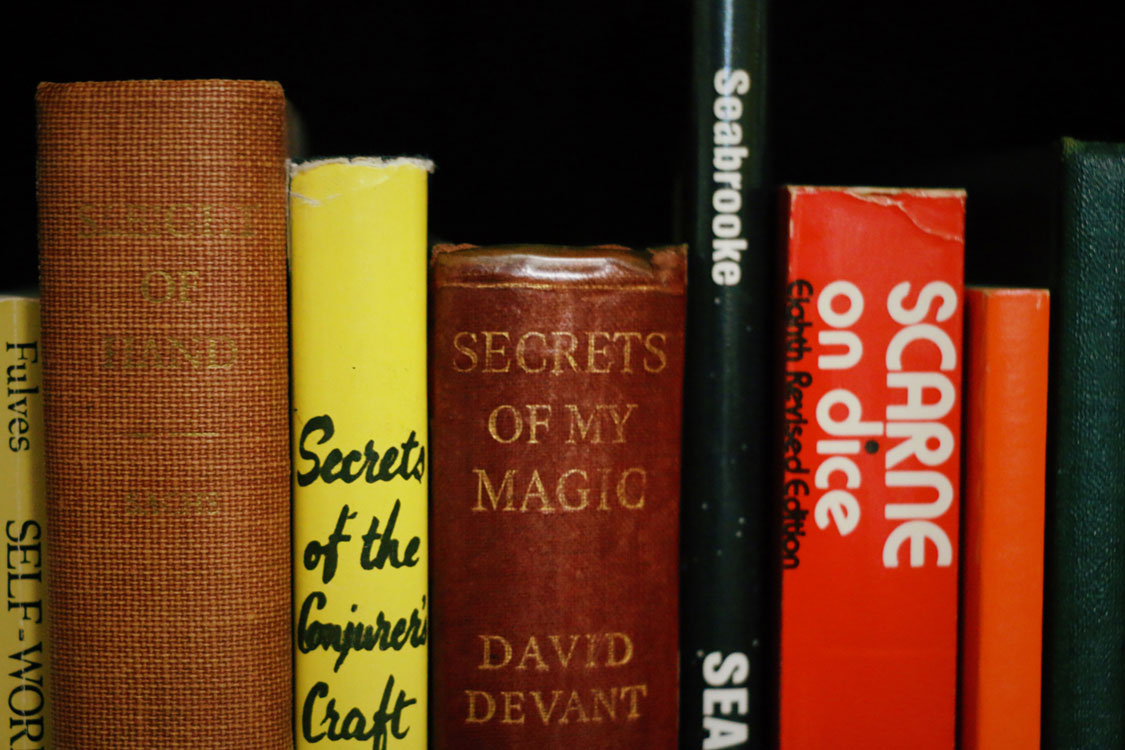
It’s a contraption that requires a magician to use distractions, like making the unsuspecting participant look at your sudden, jarring hand movements. Then you slam the cup with a piece of rubber that is attached to your back, which becomes attached to the glass and sends it behind you, vanishing from the eyes of the — now confused — participant.
“We have the tricks and we have the secrets. That is our business.”
“People all want to see the magic in the showroom,” says Miller. “But it’s not magic until you put it together and until you do it.”
Abbott’s is the oldest shop in town and has occupied numerous storefronts throughout the years. Most of Colon has been touched in some form or another by Abbott’s.
And you’ve probably seen a trick that was invented in the shop performed a time or two. Making things disappear is the company’s specialty. Everything from cars to elephants — yes, elephants. Abbott’s has done it all. An illusion made at Abbott’s even appeared on The Tonight Show Starring Johnny Carson many years ago and continues to appear on various niche television programs.
“We’ve done six or eight Broadway shows where they wanted some sort of magic effect, like someone to levitate or float or something like that,” says Miller. “Since I’ve been here we’ve done six different types of vanishing elephant, based on different principles. One was for Gary Moore, he had a variety show, and they had us manufacture a vanishing elephant.”
Colon Won’t Vanish
Unlike the elephant, Colon isn’t going to disappear. Sure, Las Vegas has become the haven for magicians — huge Vegas acts like Criss Angel or Penn and Teller have become most commonly associated with the art of illusion — but without Colon, magic wouldn’t be what it is today.
It’s one of the questions that fans ask to try and stump well-known magicians: What’s the magic capital of the world?
Vegas Magician Nathan Burton is never surprised when fans ask that question. And he always tells them: Colon, Michigan.
“Colon is more about the brotherhood of magic. At the convention, everybody goes to the same legion hall and talks magic,” says Burton. “If they go to a show in Vegas, everyone runs off to go see a magic show or something else.”
Burton has had a show in Sin City since 2006 and made guest appearances on several television programs, including America’s Got Talent. Burton’s show, The Nathan Burton Comedy Magic Show, has certainly made the rounds in Vegas, performing at The Aladdin Hotel and Casino first, then the Flamingo Showroom, and it now resides on the stages of Planet Hollywood Hotel and Casino’s Miracle Mile Shops.
Despite the offerings of Vegas and the many magicians who reside there — on any given night you can see David Copperfield in Sin City — Colon retains its title. It’s more honorary than literal nowadays, but magicians still credit the town with giving inspiration to what magic is today.
Attendance at Abbott’s Magic Get Together still numbers over a thousand, and FAB’s magic camp attracts enough budding magicians to sell out every year, which is enough to keep the legacy alive.
“Abbott’s Magic is how people got started in magic,” says Burton. “Almost every magician at some point in their career, whether starting out or now, is going to have a piece of that apparatus from there, or used it at one time. If Abbott’s wasn’t around, it would have an overall effect on magic as a whole.”
